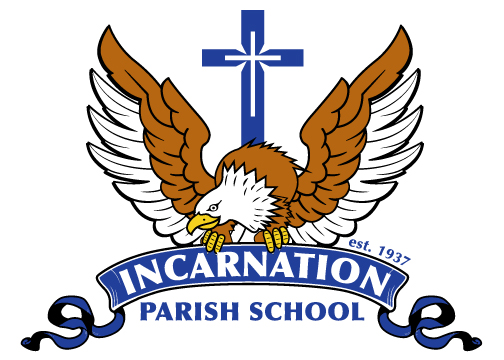Academic Integrity
Incarnation Parish School is committed to pursuing faith, excellence, and community. Violations of academic integrity directly contradict all three of these pillars. All members of the Incarnation community are expected to uphold school values and demonstrate responsible and ethical conduct whether it be in the hallways, in the classroom, during a test, in an athletic competition, or at home doing homework. Any attempt to submit or receive credit for work that was not honestly originated and completed by the student is a violation of academic integrity.
Positive and trusting relationships between student, teacher and parent are at the heart of the school community. All are expected to live by the principles of honesty and mutual trust. As the primary educators, parents are encouraged to appropriately assist students with concepts and skills, but are also supposed to model integrity in all forms. Generally speaking, homework is intended to allow a student opportunities to independently practice skills and knowledge learned earlier in the day. If a student cannot complete the homework independently then the parent should inform the teacher. This kind of feedback is important for teachers to hear. Similarly, project based learning is an opportunity for students to explore, investigate, problem solve, and create. Projects offer authentic and alternative assessment opportunities. All of these learning goals are subverted, however, when students do not do the work themselves. Concerns about a student's’ ability to independently complete homework or projects should be directly addressed with the teacher. A good rule of thumb: parents can help with, but not touch their student’s work.
Cheating and other forms of academic dishonesty, will have both academic and disciplinary consequences. Cheating implies intent to deceive. It includes all actions, devices, and/or deceptions involved in committing the act. Examples include, but are not limited to
- Utilizing crib notes/cheat sheet on an exam and copying answers directly from another student’s exam (or knowingly allowing another student to copy one’s answers).
- Copying someone else’s work, homework, quizzes, other graded work or tests, or knowingly giving one’s own work to someone else to copy/use;
- Plagiarizing (see below).
- Using unauthorized aids, including unauthorized technology
- Asking, receiving, or giving information about the contents of an exam to another student
- Submitting work that is not your own (term papers, AR tests, homework, project, etc.)
Plagiarism: Learners are continually engaged with other people’s ideas: we read them in texts, hear them in lecture, discuss them in class, and incorporate them into our own writing. As a result, it is very important that we give credit where it is due. Plagiarism is using others’ ideas and words without clearly acknowledging the source of that information. Examples:
- Presenting the work of another as one’s own (i.e., failing to credit author/sources used in a work product).
- Carelessly, knowingly or Intentionally using another’s exact wording without indicating the information as a quote.
- Changing a few words in a sentence to disguise or hide the intent to plagiarize.
- Inadequately paraphrasing or summarizing ideas from a source in a way that still uses the original author’s exact words, phrases, sentence structure, or organization of ideas without appropriate citation or quotation marks.
- Failing to cite electronic or others resources if they are utilized in any way as resource material in an academic exercise.
- Inadequately citing work that does not clearly indicate what ideas or words were taken from another source.
Incarnation Parish School serves students preschool age through 8th grade. Consequences for academic dishonesty depend largely on the level of academic and moral development expected from students at different age/grade levels.
When a teacher or school administrator determines that a violation of academic integrity has occurred there are both academic and disciplinary consequences. Student and teacher will meet to make sure that there is an adequate understanding of the act in question and to discuss alternative academic behavior would have been more honest and appropriate. Students will receive an “F” on the assignment, parents will be contacted, and a Student Behavior Report will be issued. Students may be precluded from academic distinction (i.e. honor roll and CJSF), extra and co-curricular activities (i.e. sports and student council), suspended, or even expelled.

